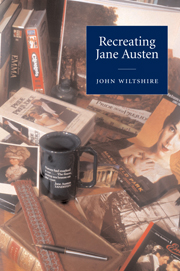Book contents
- Frontmatter
- Contents
- Preface and acknowledgments
- A note on texts
- Introduction: ‘Jane Austen’ and Jane Austen
- 1 Imagining Jane Austen's life
- 2 Recreating Jane Austen: Jane Austen in Manhattan, Metropolitan, Clueless
- 3 An Englishwoman's constitution: Jane Austen and Shakespeare
- 4 From drama, to novel, to film: inwardness in Mansfield Park and Persuasion
- 5 Pride and Prejudice, love and recognition
- 6 The genius and the facilitating environment
- Notes
- A note on films cited
- Bibliography
- Index
5 - Pride and Prejudice, love and recognition
Published online by Cambridge University Press: 22 September 2009
- Frontmatter
- Contents
- Preface and acknowledgments
- A note on texts
- Introduction: ‘Jane Austen’ and Jane Austen
- 1 Imagining Jane Austen's life
- 2 Recreating Jane Austen: Jane Austen in Manhattan, Metropolitan, Clueless
- 3 An Englishwoman's constitution: Jane Austen and Shakespeare
- 4 From drama, to novel, to film: inwardness in Mansfield Park and Persuasion
- 5 Pride and Prejudice, love and recognition
- 6 The genius and the facilitating environment
- Notes
- A note on films cited
- Bibliography
- Index
Summary
Morality in the novel is the trembling instability of the balance.
D. H. Lawrence, ‘Morality and the Novel’The ‘great subjects’ of Pride and Prejudice, as Lilian Robinson put it, are ‘class, love, money and marriage’. The producer of the successful BBC television version of the novel first shown in 1995 declares too that ‘though it's about many things, it's principally about sex, and it's about money: those are the driving motives of the plot’. This film, which I shall refer to later in this chapter, very convincingly represents the sexual attraction that impels Fitzwilliam Darcy towards Elizabeth Bennet, and also contrives to suggest that Elizabeth is unconsciously attracted towards him. The critical tradition has generally insisted however that there is another thread to the plot that is equally, if not more, crucial, a thread one might briefly call epistemology. The novel is ‘most importantly’, wrote Tony Tanner, for example, ‘about prejudging and rejudging. It is a drama of recognition – re-cognition, that act by which the mind can look again at a thing and if necessary make revisions and amendments until it sees the thing as it really is.’ Such readings, in which Elizabeth, in Marilyn Butler's words, arrives at ‘true criticism of the self via correct, humbling assessment of another’ are plentiful, but come uncomfortably close to the ‘girl being taught a lesson’ syndrome pilloried by Sedgwick, and risk suggesting that Elizabeth accepts Darcy the second time round solely because he is so kind to his servants and so decent to the Gardiners (or, on the other hand, because of the magnificent grounds of Pemberley!).
- Type
- Chapter
- Information
- Recreating Jane Austen , pp. 99 - 124Publisher: Cambridge University PressPrint publication year: 2001

